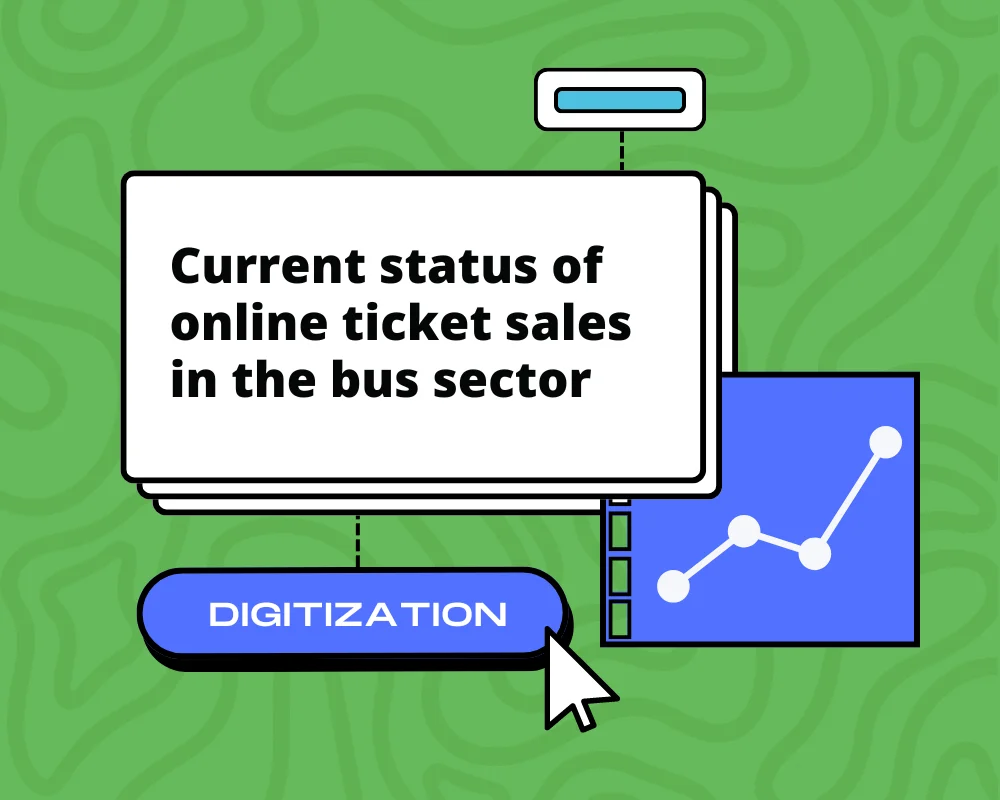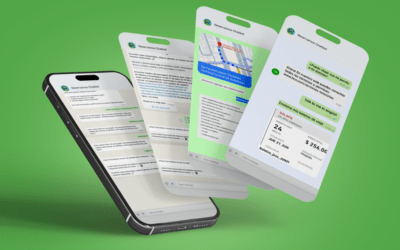Learn about the adoption of advanced technologies and how bus companies can leverage these changes to deliver a better traveler experience, increase revenue, and stay competitive in an ever-evolving industry.
When discussing technological innovation trends in the bus sector in Latin America, the first thing that stands out is the investment in new buses to replace their fleets. This includes opting for buses that are more environmentally friendly and fuel-efficient.
According to Statista, with growing concern about climate change and air pollution, travelers are increasingly looking for buses with lower emissions and better fuel economy.
This has led to increased demand for electric and hybrid buses. In addition, customers are also looking for buses that offer more comfort and amenities, such as air conditioning, Wi-Fi connectivity, and ergonomic seats.
This trend, according to Statista, is particularly evident in countries with large metropolitan areas, such as Brazil and Mexico. Another trend in the market is the adoption of smart technologies in buses. This includes features such as GPS tracking, real-time passenger information systems, and contactless payment options.
However, technological innovation in the sector has focused, for now, on the offline side by renewing fleets and choosing innovative technologies for bus operations.
The online side of the industry still has a long way to go to offer a completely innovative experience that involves offering travelers a ticket purchase without the need to go to the ticket office culminating in a bus ride that offers the best amenities.
Digital transformation landscape in the bus sector
Approximately only 15% of Latin American companies (enterprises) have developed their technology for eCommerce and revenue management, so costs and implementation times tend to be higher in terms of technology acquisition and longer implementation times.
The rest (small and medium-sized companies) work with white labels of online travel agencies (OTAs), which has reduced their positioning and lack of data on their passengers to make better decisions in different areas (marketing, operations, finance, SAC), according to an analysis conducted by Reservamos SaaS.
Based on our analysis, the most used technological tools by bus companies in the region, 90%, are only Google Analytics, Facebook Pixel, or Tag Manager.
Less than 1% use tools such as Hotjar, a product experience insights platform that provides behavioral analysis and feedback data to help empathize and understand customers, or more advanced tools to know the behavior of each of your travelers, where in the process they leave your website, what is the recurrence of purchase of a person.
There is low adoption of technology and a low percentage allocated to investment in this type of technological tool or solution. Less than 0.5% of the total revenue of bus companies is allocated to IT.
On the contrary, in the airline sector, the budget allocated to IT service management has gained ground. In 2022 the increase was noticeable, due to spending that reached 4.73% of revenue, compared to the 4.66% recorded in 2021, according to the 2023 Air Transport IT Insights report, conducted by the multinational company SITA.
Airline investment priorities have focused on improving mobile passenger services, strengthening cybersecurity, and enhancing cloud services capabilities.
According to the report, airlines are also betting on data management for business intelligence, data exchange technologies, Artificial Intelligence, and radio frequency identification and tracking of baggage (RFID).
Against this backdrop, how can bus companies join the digitization of their ticketing channels? Below we share with you the route they could follow to avoid losing the opportunity to take control of their sales and increase their revenues.
How bus companies can go digital
In order not to be left out of the digitalization process, bus companies have the option of adding a technological partner that has the expertise to help them take control of direct ticket sales.
For example, Reservamos SaaS works as a technological ally that helps to evolve the digital sale of tickets, through a dynamic, efficient, and customizable platform for any brand and needs.
The Reservamos SaaS eCommerce platform helps bus companies enhance their digital channels, boost sales, and cut costs. It offers a robust analytics tool for understanding traveler behavior through data.
The data is 100% owned by the bus company, with 24/7 access. In addition to having different payment gateway options, adapted to the most popular in each country, and ticket distributors.
The eCommerce platform of a technology partner like Reservamos SaaS aims to ensure better digital shopping experiences. Especially in a context where consumers have become accustomed to the convenience and speed of online shopping, bus companies have had to adapt quickly to meet these new demands.
It is almost impossible to survive in a scenario without digitization. The decision to change does not come from the companies but from the customers. We decided that we love to have everything on the screen of our smartphones and computers. No turning back. -Thiego Paes, Country Manager for Brazil at Reservamos SaaS.
This transformation has been driven by several factors, such as the increased use of mobile devices, Internet penetration in urban and rural areas, and the need to offer more secure and efficient purchasing solutions in a post-pandemic world.
Online ticketing not only facilitates the purchasing process for passengers but also provides companies with valuable opportunities to collect data and personalize their services.
In some countries in Europe and North America, it is estimated that between 30% and 70% of bus tickets are sold online. In emerging markets, this percentage may be lower, but it is growing steadily.
In Brazil, one of the largest markets, it is estimated that between 40% and 50% of bus tickets are sold through OTAs. While in the direct channel, sales represent 10-15% on average.
Revenues in the bus ticket market in Latin America are expected to reach US$3.36 billion by the end of 2024, according to Statista.
Revenues are expected to show a 2.37% annual growth rate, resulting in a projected market volume of US$3.69 billion by 2028. As for the number of users, it is projected to reach 60.31 million by the same year, according to Statista.
Of the total bus ticket market revenue, 56% is going to be generated through online sales by 2028. Therefore, the digital channel will become increasingly important for bus companies’ revenues in the region.
However, it is important to consider that an eCommerce platform is the gateway for a digitalization process in a bus company.
Digitalization is not having an eCommerce site, but a set of data management, personalization technology for customers, offering the best prices for the right customers, analyzing the market for decision-making, and simplifying the customer’s buying process. -Thiego Paes, Country Manager for Brazil at Reservamos SaaS.
According to Thiego, an eCommerce site is the easiest and initial step to start the digitalization and customer service process. He believes that digitalization will allow bus companies to achieve 3 milestones:
- Take care of the customer and offer the best product for travelers.
- Knowing the customer and understanding how the product can help them simple and objective way.
- Taking care of the business to offer the best service, at the best price (not the cheapest, but at the price that the traveler needs as a value proposition) and with more efficient and simple processes that allow generating more value for travelers.
The digital transformation process is complex and requires significant investment. Additionally, experts in this field are increasingly hard to come by in the market. Finding a business partner who is a technology expert with relevant experience can greatly expedite the transformation process and add significant value. -Thiego Paes, Country Manager for Brazil at Reservamos SaaS.
How to leverage data to improve the traveler experience
Leveraging data to improve the traveler experience is essential in today’s digital world. Bus companies can use information gathered from various sources, such as the online direct ticketing channel, to offer more personalized, efficient, and satisfying services.
On the part of travelers, a trend is beginning to prefer to buy in the direct channel because it generates greater trust and the benefits that companies provide for their loyalty to their brands. This is a trend in the hotel industry, where one major player, Marriott, has seen membership in its loyalty program grow by a third in three years, and after executives touted the loyalty program as a cost-effective way to acquire customers.
Last year, Marriott reported record direct bookings. Direct bookings allow hotels to avoid the 10% to 30% commissions that online travel agencies charge, according to Skift.
Here’s how you can leverage traveler data to drive direct ticket sales:
1. Personalizing the traveler experience
Use data to better understand your passengers’ preferences and behaviors. With this information, you can personalize offers and recommendations, such as suggesting frequently used routes, offering preferred seating, and sending relevant promotions.
2. Price optimization
Analyze purchase data and demand to dynamically adjust prices. This not only maximizes revenue but also ensures that passengers find attractive pricing options based on their needs and shopping times.
3. Improved customer service
Data can help identify common problems and areas for improvement in customer service. With this information, you can implement proactive solutions, better train your staff, and offer more efficient and friendly service.
4. Loyalty programs
Create and adjust loyalty programs based on purchase and behavioral data analysis. Reward frequent travelers with points, discounts, and other benefits that they truly value, thus incentivizing loyalty and direct bookings.
5. Marketing segmentation
Segment your customer database to send targeted communications and offers to different groups. This allows for more effective marketing campaigns, ensuring that messages reach the right audience at the right time.
6. Improved route and schedule management
Analyze travel patterns to optimize your bus routes and schedules. This not only improves operational efficiency but also ensures that you are offering options that fit the needs of your passengers.
7. Simplified shopping experience
Use data to simplify the booking and purchasing process. Implement features such as auto-fill information, recommendations based on past purchases, and preferred payment options to make the process faster and more convenient.
8. Feedback and surveys
Collect and analyze passenger feedback to better understand their needs and expectations. Satisfaction surveys and comments can provide valuable insights on how to improve the traveler’s experience at different stages of the journey.
The current state of online ticketing in the bus sector in Latin America reveals both significant challenges and opportunities. While companies have begun to invest in more modern and greener fleets, true digital transformation is still in its early stages. The adoption of advanced technologies for sales management and customer service personalization remains limited.
The evolution to a more digital sales model is not only about having an online presence but also about integrating analytics and data management tools to enhance the traveler experience and optimize operations. Companies that leverage these technologies will be able to offer more personalized and efficient services, increase customer satisfaction, and ultimately increase revenue.
The online bus ticketing market is experiencing significant growth, and there are positive projections for the future. However, to take advantage of these opportunities, companies need to invest in strong technology platforms and strategic partnerships. These investments will not only improve the booking experience but also provide valuable data for making informed and strategic decisions.
Digitization of the ticketing channel is not just a trend, but an urgent necessity for bus companies in Latin America. Those who adopt these technologies will be better positioned to meet the demands of travelers and remain competitive in a constantly evolving market.




